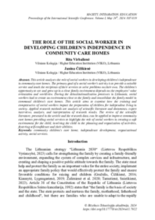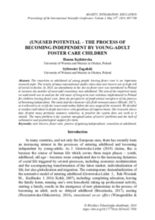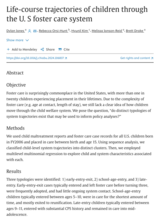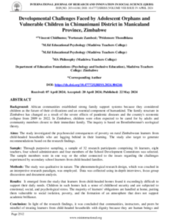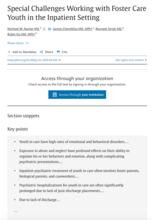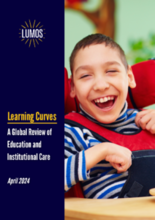Demographic Data
|
Sources: World Bank, UNICEF, UNDP HDR 2015, DHS 2011 |
Displaying 61 - 70 of 14305
This article aims to examine how the training and competencies of social workers during the deinstitutionalization processes in Lithuania impacted the preparation of children for independent living in society. The review of the scientific literature, presented in the article and the research data, can be applied to improve community care homes providing social services to highlight the role of social workers in creating a safe environment for the child, involving the child in the planning and organization of activities, fostering self-confidence and their abilities.
The aim of this empirical study was to analyse the relevance of long-term care solutions implemented in Poland for children leaving foster care, from the perspective of professional caregivers of the process of becoming independent.
This article details the authors' findings that provide the first description of foster care trajectories in the US. Both practice and policy formulation can benefit from these empirically supported descriptions. Using such trajectory typologies, researchers can now explore how trajectories may predict wellbeing outcomes.
Join ECDAN for an upcoming webinar to discuss strategies to put children at the center of climate action.
The study investigated the psychosocial consequences of poverty on rural Zimbabwean learners from child-headed households who are lagging behind in their learning. The study also aimed to generate recommendations based on the research findings.
This article details to unique challenges faced by youth in care in the US when receiving inpatient treatment and how that varies in several ways from the care of non-foster care youth. Children in care have more medical, behavioral, and psychiatric problems and require health care at higher rates than youth not engaged in the child welfare system.
This course will consider the foster carer's key role in providing parent and child arrangements and ensuring successful outcomes for children. It will also provide clarity about the role of the agency and the supervising social worker in monitoring, reviewing, evaluating and supporting foster carers, whilst making certain that practice is transparent and compliant with the law.
This Global Thematic Review on Education examines the under-researched relationship between education and institutional care.
Resistance from donors is a common barrier for organizations transitioning from residential care to family-based care. What works to sustain and even increase funding for organizations in transition?
Dr. Charles Nelson III, a Professor of Pediatrics and Neuroscience and Professor of Education at Harvard University, explains the role of experience in brain development, the effects of early profound deprivation on development, the history of institutional care, and an overview of institutional care at an international conference on 21 March 2024.

